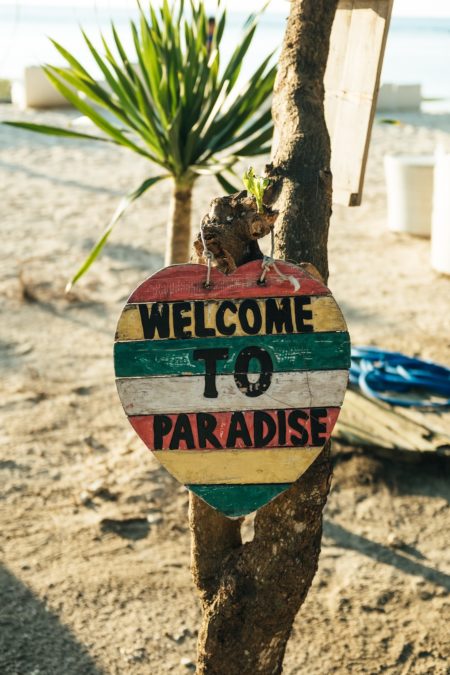The Agony of Paradise
God hides the fires of hell within Paradise.
— Paul Coelho
Things rarely play out the way we expect or want them to, or the way we imagine them. That became painfully clear to me when I was offered a free ticket to Paradise. An Oscar winning cinematographer I’d been seeing for a short time (I’ll call him Nick), invited me to spend two months with him on his private island in Tahiti. I could hardly
believe it. I had moved into my own apartment, I was having a hard time living alone, and I was more than ready to escape myself, to venture out and leave my fears and my problems behind. I pictured romantic nights on the white sand beach, making love under the stars and skinny-dipping beneath a full moon. I envisioned balmy nights, swaying palm trees, warm ocean waters, perpetual
sunshine, and ripe fruit you could pluck right off the trees. An enchanted garden.
I’m aware of how many people would have traded places with me when Paradise opened its doors and invited me in, but to my surprise and disappointment, the dream I’d had about where I was going and how I would feel were worlds apart from reality. We
had no running water. There were no toilets. We had to do our business standing over a hole in the ground. The palm trees swayed gacefully, but the high winds caused them to drop ominously heavy coconuts without warning. The wild chickens never stopped squawking, the roosters crowed all night long, and the cuddly
looking kittens had fleas. The rain was fierce, the ocean floor was strewn with thick black slugs that made swimming an exercise in icky-ness, the woven thatched huts needed constant maintenance, the warm tropical sunshine caused the fruit on the trees to heat up and rot and the ground was filled with tupa crabs scurrying underfoot to get to their holes. Worst of all, the balmy trade winds blew bloodthirsty mosquitoes into my face, day and night. They made it through the netting around our bed and while Nick was untouched, I had a swollen face after two days. I spent a great deal of the time scatching my insect bites and hovering over moquito repellent coils, feeling sad and ashamed. I had wanted to leave who I was behind, but I had brought myself with me and if I couldn’t feel good in Paradise, there had to be something wrong with me.
The point of the story is that annoying cliché: wherever you go, there you are. Even if the island had lived up to my dreams, I still had to find a way to stare my fear of being alone in the face and do the hard work to accept myself. Nick could not have been happier to be there, his own little Eden, but that was Nick. Not me. When I realized I was trying to live someone else’s life (hardly for the first time), I cut the trip short by a month and flew back home. I lay in my bed, propped up on my down pillows, stroking my cat with the TV on, and I understood that Paradise is not a place. It’s a state of mind. It’s about developing the mindfullness to make peace with ourselves and accept who and what we are.
But as hard as we try, acceptance doesn’t happen in a straight line. You get angry with yourself, you feel ashamed, you wallow in
your misery, and then, as if by magic, you forgive yourself. But there is nothing magical about it when you wake up the next day to see that you’re riding the downward spiral of anger and self-blaming once again. The act of rising above these emotions is a practice, not something you reach and it’s fixed forever.
For some reason, we like to tell ourselves stories, more often bad ones rather than good ones, all untrue, that catapult us into the punishing spiral of fear and self-loathing. But if we can find endurance and have faith in ourselves, we can save ourselves. We can create our own form of Paradise. Life may play out in a way that feels unfair and punishing, and it will, but if we can view those difficult experiences as teachings, we can ride that same spiral
back up again to a state of freedom as each stage on the journey unfolds naturally upwards from the previous one.
We may chide ourselves for staying in that bad reltationship for too long, loath to stay and afraid to go, but what if we could see that we had left the relationship in perfect timing when we had learned the
lessons? What if we could see that disappointment and compassion bring us closer to ourselves, that Paradise is whatever makes us feel happy and fulfilled. I want to be clear here that this is not my version of “everything happens for a reason,” or “we create our own reality.” Contrary to popular opinion, I find those ideas flawed and much too complicated to make any real sense. I believe that if we do what it takes to face our fears and hone our ability to stay present, to stop making up scary and false stories that we can’t live up to and never come true, we can make it through and find peace. In Buddhist practice, they say that if we can stay aware and mindful enough to avoid taking the first step into that negative abyss, we are on our way to freedom, wherever we are, as each stage on the journey unfolds naturally from the one before.
This is Paradise, a place where we know the truth and accept ourselves anyway.


Recent Comments